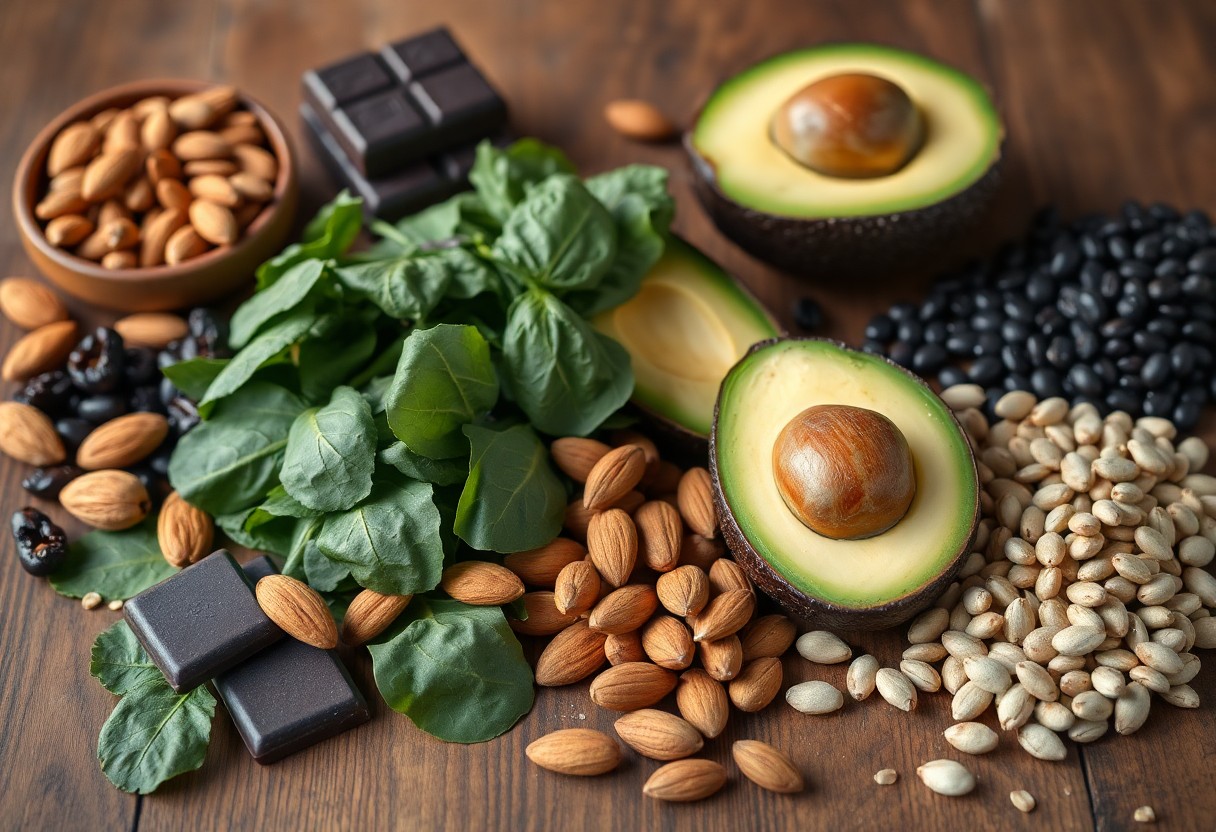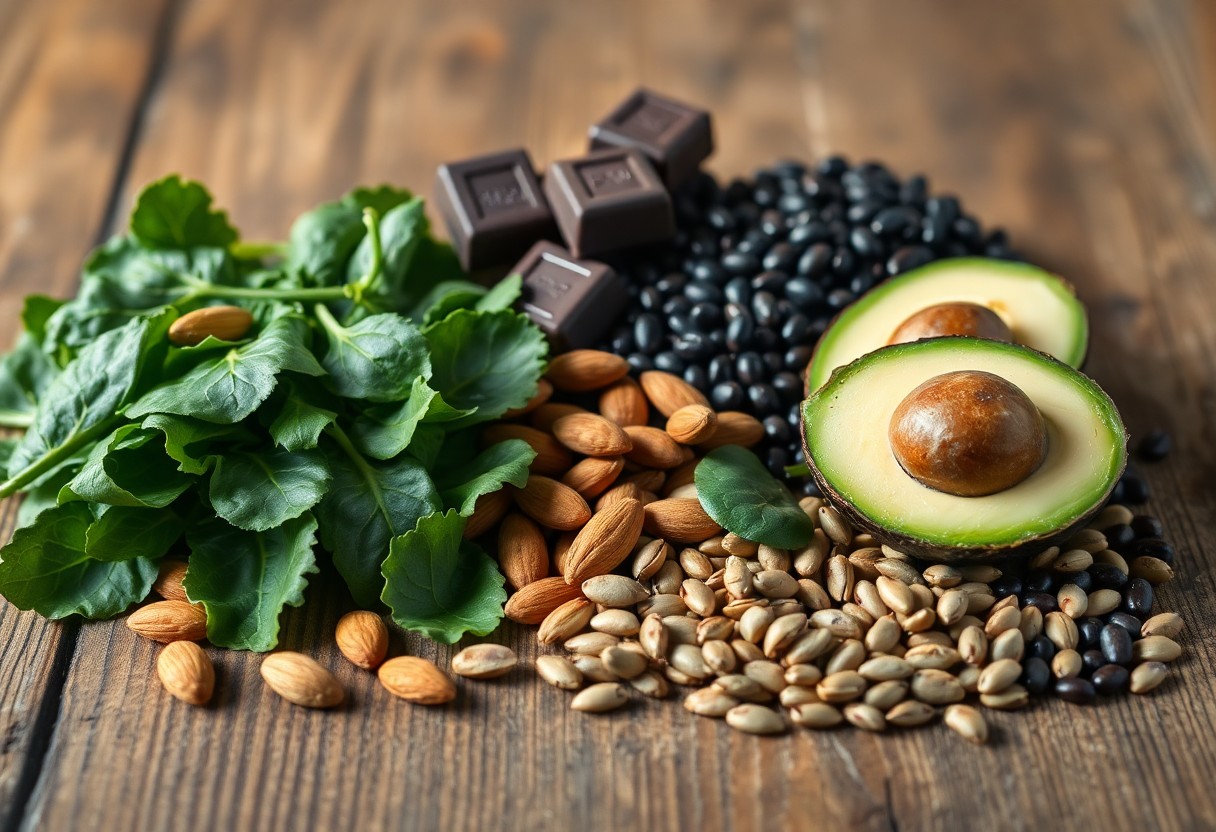You may not realize how crucial magnesium is for your overall health, but it's fundamental for various bodily functions, including muscle and nerve function, energy production, and bone health. Ensuring you have enough magnesium in your diet can significantly enhance your well-being. In this post, we will explore the top food sources high in magnesium, making it easy for you to incorporate them into your daily meals for improved health and vitality.
The Importance of Magnesium
Your body needs magnesium for over 300 biochemical reactions, making it crucial for overall well-being. This vital mineral helps maintain muscle function, supports the nervous system, and plays a role in energy production. By incorporating healthy foods high in magnesium into your diet, you can better support these bodily functions and promote optimal health.
Role of Magnesium in the Body
Along with its involvement in muscle and nerve function, magnesium contributes to the synthesis of DNA and proteins. This mineral also supports the regulation of calcium levels, benefiting bone health and cardiovascular function. A well-balanced intake of magnesium aids in numerous physiological processes, ensuring smooth operation within your body.
Benefits of Sufficient Magnesium Intake
Along with preventing deficiencies, a proper intake of magnesium can enhance your quality of life by potentially reducing stress and promoting better sleep. Studies suggest that adequate magnesium levels may lower the risk of chronic diseases such as hypertension, cardiovascular diseases, and type 2 diabetes, which can help you maintain a healthier lifestyle.
Indeed, sufficient magnesium intake can also improve your mood and cognitive functions, contributing to mental clarity and emotional well-being. You may find that a magnesium-rich diet can alleviate symptoms of anxiety and depression, reinforcing the importance of this mineral. With the right balance of magnesium, you can better navigate daily stressors and enhance your overall quality of life.

Foods High in Magnesium
If you are looking to boost your magnesium intake, incorporating certain foods into your diet can make a significant difference. Magnesium plays an crucial role in various bodily functions, including muscle and nerve function, blood sugar control, and bone health. By choosing the right foods, you can enhance your overall well-being while enjoying delicious and nutritious options. Here are some top picks that are high in magnesium.
Leafy Greens
Around leafy greens like spinach, kale, and Swiss chard, you will find some of the best sources of magnesium. These vibrant vegetables not only provide magnesium but also offer a wealth of vitamins, minerals, and antioxidants that contribute to your overall health. Adding these greens to your salads or smoothies is a simple way to increase your daily intake.
Nuts and Seeds
Beside their crunchy texture and delightful flavors, nuts and seeds are packed with magnesium. Almonds, cashews, and pumpkin seeds are particularly high in this crucial mineral, making them a tasty and nutritious snack option. When included in your diet, these foods can help support various bodily functions and promote overall health.
Seeds, such as pumpkin seeds and flaxseeds, are especially concentrated sources of magnesium. Incorporating a handful of these seeds into your meals or snacks can provide significant magnesium levels. They can easily be added to yogurt, oatmeal, or smoothies for an extra nutrient boost. Eating a variety of nuts and seeds not only helps increase your magnesium intake but also contributes healthy fats and protein to your diet, promoting a balanced lifestyle.
Whole Grains and Legumes
Many people overlook the significant health benefits of whole grains and legumes, which are excellent sources of magnesium. Incorporating these foods into your diet can enhance your overall wellness. Whole grains like oats, barley, and brown rice not only provide magnesium but also fiber, promoting digestive health. Legumes, including various beans and lentils, are rich in protein and other imperative nutrients while being great magnesium powerhouses. By adding these foods to your meals, you can boost your magnesium intake and support your body’s needs.
Quinoa and Brown Rice
After a long day, you might want to choose comforting yet nourishing grains for dinner. Quinoa and brown rice are both excellent choices, offering a good dose of magnesium along with their substantial health benefits. Quinoa, a complete protein, is packed with dietary fiber, making it a perfect side dish or base for salads. Brown rice, on the other hand, is an easily digestible food that provides sustained energy and is versatile for various meals. Enjoy these grains as part of a balanced diet to enhance your magnesium levels.
Beans and Lentils
Brown rice pairs wonderfully with beans and lentils, both of which are remarkable sources of magnesium. These legumes not only contribute to your daily magnesium intake but also provide ample protein and fiber, making them filling choices for any meal.
Whole beans, such as black beans and kidney beans, are incredibly versatile and can easily be added to salads, soups, or burritos. Lentils, available in various colors, can be cooked as a hearty soup or blended into spreads. The combination of legumes and whole grains enhances nutrient absorption and ensures you maintain a balanced diet. By incorporating beans and lentils into your meals, you’ll enjoy increased energy, improved digestion, and enhanced overall health.
Fruits and Vegetables
Unlike many other food groups, fruits and vegetables not only provide important vitamins and minerals but also serve as excellent sources of magnesium. By incorporating a wide variety of these colorful foods into your diet, you can easily increase your magnesium intake while enjoying numerous health benefits. Fresh produce, such as leafy greens and certain fruits, will not only satisfy your taste buds but also elevate your overall well-being.
Avocados and Bananas
At the forefront of magnesium-rich fruits, avocados are not only creamy and delicious but also packed with nearly 58 mg of magnesium per one avocado. Bananas, another popular choice, provide about 32 mg per medium-sized fruit, making them a convenient snack that boosts your magnesium levels on the go.
Potatoes and Peas
Across the vegetable spectrum, potatoes and peas are noteworthy contenders, providing a significant amount of magnesium per serving. Potatoes, particularly when enjoyed with the skin, offer around 43 mg of magnesium in a medium-sized serving. Similarly, peas contribute approximately 48 mg per cup, making them a vibrant addition to your meals.
Considering the role of magnesium in energy production and muscle function, including potatoes and peas in your diet is an excellent way to support your health. Their versatility means you can enjoy them in various dishes, from hearty stews to salads. Prioritize these magnesium-filled options to help fulfill your daily requirements while enjoying flavorsome meals.
Magnesium-Rich Supplements
Keep in mind that magnesium-rich supplements can be a valuable addition to your diet, particularly if you struggle to meet your daily intake through food alone. These supplements come in various forms and can help support your overall health and wellness.
Different Types of Supplements
Below, you'll find a breakdown of common magnesium supplements:
| Supplement Type | Description |
| Magnesium Citrate | Highly absorbable form, often used to aid digestion. |
| Magnesium Oxide | Commonly used, but less absorbable than others. |
| Magnesium Glycinate | Gentle on the stomach, good for anxiety support. |
| Magnesium Malate | Excellent for energy production and muscle function. |
| Magnesium Threonate | Promotes cognitive function and brain health. |
Knowing the differences in magnesium supplements can help you choose the one that best suits your health needs.
Recommended Dosages
MagnesiumRich studies suggest that the recommended daily allowance varies based on age and gender, typically ranging from 310 to 420 mg for adults. It's important to pay attention to labels, as different forms may have varying effective dosages.
Even women who are pregnant or nursing may require different dosages, so it's wise to consult with your healthcare provider for personalized recommendations. If you're considering adding magnesium supplements to your routine, ensure your intake aligns with your dietary habits and health goals. A balanced approach is key to maximizing the benefits of magnesium while maintaining overall wellness.

Tips for Increasing Magnesium Intake
Despite the importance of magnesium in your diet, many people do not consume enough. To enhance your magnesium intake, consider the following tips:
- Incorporate more leafy greens into your meals.
- Snack on nuts and seeds regularly.
- Choose whole grains over refined options.
- Try magnesium-rich foods like beans and avocados.
- Add dark chocolate to your treat list.
Thou can learn more about this necessary mineral by visiting the Magnesium - Health Professional Fact Sheet.
Meal Planning Strategies
With careful meal planning, you can easily boost your magnesium intake. Start your week by outlining meals that incorporate magnesium-rich foods, ensuring a variety of colors and textures on your plate. Incorporate a mix of grains, legumes, nuts, and vegetables to add both nutrients and flavor to your meals.
Cooking Methods
One effective way to retain magnesium in the food you prepare is by selecting healthier cooking methods. Boiling can often lead to the loss of necessary nutrients, while steaming, baking, or sautéing helps preserve magnesium levels.
Understanding how different cooking methods affect nutrient retention is key to boosting your magnesium intake. For example, when you steam vegetables instead of boiling them, you minimize the loss of magnesium and other vital nutrients. Opt for methods like grilling or roasting to keep both the flavor and magnesium content intact, ensuring that your meals are not only delicious but also beneficial for your health.
Conclusion
Taking this into account, incorporating foods high in magnesium can significantly enhance your health and well-being. By focusing on nutrient-dense options like leafy greens, nuts, seeds, and whole grains, you can ensure your body receives the crucial minerals it needs for optimal function. Pay attention to how these foods make you feel and adjust your diet accordingly to support your overall wellness. With a mindful approach to your nutrition, you can enjoy the benefits of increased energy levels, improved mood, and better physical performance.
FAQ
Q: What foods are considered high in magnesium?
A: Foods that are high in magnesium include leafy green vegetables, nuts and seeds, whole grains, legumes, and certain fruits. Examples include spinach, almonds, black beans, avocado, and bananas. These foods provide a good amount of magnesium per serving, contributing to overall dietary intake.
Q: How does magnesium benefit health?
A: Magnesium plays a role in numerous bodily functions, including muscle and nerve function, blood sugar control, and blood pressure regulation. It also aids in the synthesis of protein and the production of DNA and RNA. Adequate magnesium intake may support heart health and reduce the risk of conditions like diabetes and osteoporosis.
Q: Are there any specific dietary recommendations for increasing magnesium intake?
A: To increase magnesium intake, incorporate a variety of magnesium-rich foods into your meals. Try adding spinach to salads, snacking on nuts, or using whole grains like quinoa or brown rice instead of refined grains. Additionally, consider using legumes such as lentils or chickpeas in soups and stews for an easy boost.
Q: Can deficiencies in magnesium affect health?
A: Yes, a deficiency in magnesium can lead to various health issues, such as muscle cramps, fatigue, and increased risk of chronic diseases. Symptoms may also include irritability and sleep disturbances. Ensuring sufficient magnesium intake through diet is important for maintaining overall health and wellness.
Q: Are there any supplements for magnesium and when should they be used?
A: Magnesium supplements are available and can be beneficial for individuals who have trouble meeting their magnesium needs through food alone. It's advisable to consult a healthcare provider before starting any supplements, especially if you have pre-existing health conditions or take medications, as excessive magnesium can have adverse effects.

0 Comments